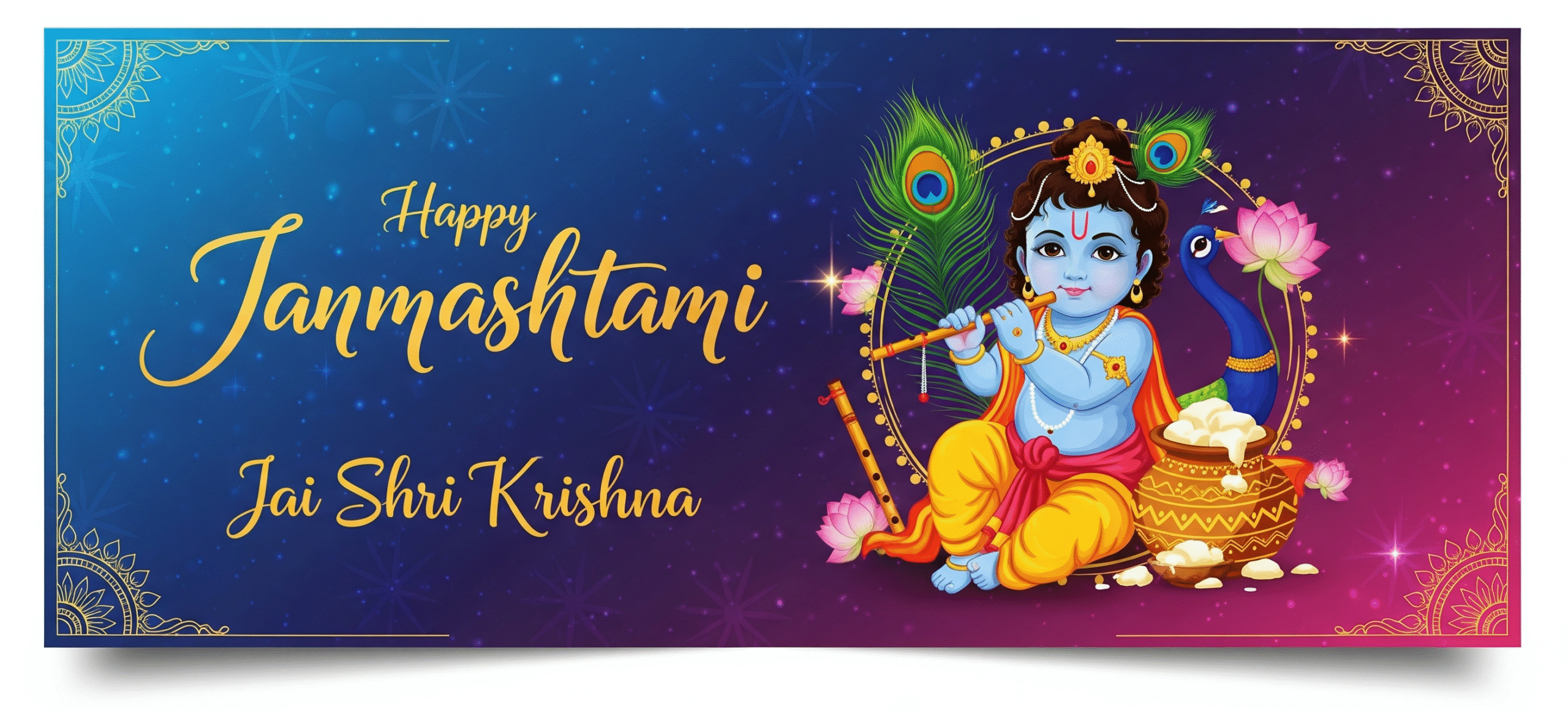Origin and Mythological Backdrop
Janmashtami celebrates the divine birth (Janma) of Lord Krishna, the eighth avatar of Lord Vishnu, in Mathura over 5,100 years ago according to Vedic chronology. As narrated in the Srimad Bhagavatam, Krishna was born at midnight to Devaki and Vasudeva in a prison cell under the tyrannical rule of King Kamsa. His birth was not only a miraculous event but also marked the descent of the Supreme Consciousness to restore righteousness (Dharma) and eradicate evil from the world.
Janmashtami is traditionally observed on the eighth day (Ashtami) of the waning moon in the Hindu month of Bhadrapada. It is believed that the festival’s practices first took root in Gokul and Mathura, eventually spreading throughout India.
Significance and Spiritual Essence
-
Victory of Good Over Evil: Krishna’s arrival signified the triumph of good over evil and injustice. His teachings in the Bhagavad Gita continue to guide seekers toward righteousness and self-mastery.
-
Embodiment of Divine Bliss and Love: Krishna represents ‘Ananda’ (bliss), unconditional love, and limitless compassion. His life, especially the playful and loving episodes with Radha and the gopis, remain central themes of devotion (bhakti).
-
Symbolism of Birth: Spiritually, the birth of Krishna symbolizes the awakening of joy, innocence, and inner divinity within each soul. Devaki (the mother) signifies the body, Vasudeva (the father) represents prana or life force, and Kamsa (the maternal uncle) symbolizes ego. The suppression of joy by ego and its eventual liberation through devotion and surrender are profound lessons embedded in Janmashtami’s mythology.
-
Festival of Bhakti and Unity: Janmashtami unites communities through fasting, singing devotional songs, re-enacting episodes from Krishna’s life, and night-long vigils—a collective expression of love, surrender, and faith.
Spiritual Practices and Observances
-
-
Fasting until midnight, when Krishna is believed to have been born.
-
Recitation of Krishna kirtans, bhajans, and the Bhagavad Gita.
-
Rituals include abhishekam (ceremonial bathing of Krishna idols), swinging the divine infant in decorated cradles, offering sweets like makhan-mishri (butter and sugar), and floral decorations.
-
Astrological Remedies for Janmashtami 2025
Janmashtami 2025 coincides with a rare and auspicious alignment called Budh-Mangal Yog (Mercury–Mars aspect), enhancing clarity, courage, and swift action. Astrologers recommend several remedies for prosperity, health, and peace on this sacred day:
-
Offer White Butter and Mishri to Lord Krishna: This aligns your thoughts and speech with purity and boosts Mercury’s positive effects, helping resolve relationship issues and remove obstacles in communication.
-
Light a Ghee Lamp Below a Tulsi Plant: Tulsi is sacred to Lord Krishna and balances Mars’ action with devotion. Light a lamp at dusk, chant Krishna mantras, and pray for courage, balance, and spiritual progress.
-
Recite/Chant:
-
Vishnu Sahasranama: Chanting these names strengthens mental focus, physical health, and removes delays in success—especially with the interplay of Mercury and Mars this year.
-
Om Namo Bhagavate Vasudevaya (“ओम नमो भगवते वासुदेवाय”) on Tulsi mala for 108 times.
- Om Shri Krishnaya Govindaya Gopijana Vallabhaya Namah for wealth.
-
-
Donate Yellow and Red Items to the Needy: Yellow (Mercury) and red (Mars) harmonize planetary vibrations. Donate yellow dal, red cloth, or jaggery for a karmic shift and planetary blessings.
-
Perform Charanamrit Abhishek: Bathe Krishna’s idol with a mixture of milk, yogurt, ghee, honey, and sugar—this invites blessings for clarity, health, and prosperity.
-
Offer Kheer with Tulsi: Pleasing Krishna with a bowl of kheer (rice pudding) and Tulsi leaves is believed to promote quick financial gains and prosperity.
-
Start Reciting the Santan Gopal Stotra: Especially beneficial for those seeking progeny or family happiness; ideal to begin on Janmashtami night.
-
Feed Cows or Donate Clothes: Traditional Vedic practice to attract love, harmony, and growth in both personal and professional spheres.
Note: These astrological and spiritual remedies are best practiced with sincerity, devotion, and ethical intent on Janmashtami midnight.
Janmashtami, thus, is much more than a historical festival—it is an invitation to awaken love, innocence, and the divine within us through spiritual discipline, selfless service, and remembrance of Krishna’s teachings. The ancient rituals and remedies performed on this day invoke cosmic harmony and amplify blessings for all who participate with faith and devotion.



